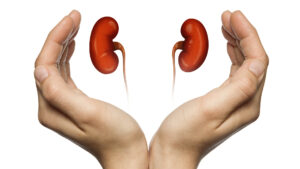Health Check: Smiles all around as PainChek wins FDA clearance for its groundbreaking digital app

PainChek's world's first app is revolutionising pain detection and management in the aged-care sector. Pic:Getty Images
- PainChek can now tackle the US$100 million US aged-care market – while other geographies beckon
- Trivarx shares leap 9% on depression detection trial results
- Dimerix gets more assurances on using surrogate endpoints in its pivotal kidney trial
PainChek (ASX:PCK) says the US Food & Drug Administration (FDA) has provided clearance for its digital pain assessment device – the world’s first of its kind.
The clearance means the company can sell to an aged-care market of 3 million long-term care beds – an initial addressable market of US$100 million ($150 million) per annum.
The PainChek algo detects pain in people unable to enunciate their discomfort, such as dementia sufferers.
CEO Philip Daffas dubs the clearance a “transformative achievement” for the company – no doubt especially so given the company made its FDA entreaty under the harder, more exclusive De Novo (new device) route.
“It validates our innovative technology and provides the foundation for accelerated US market growth, building off our established success in Australia and the momentum we’ve recently achieved in the UK,” said Daffas.
The FDA nod streamlines PainChek’s entry into additional US market segments including home care and hospitals. This takes the company’s US aged care market opportunity to around US$370 million ($582 million) a year.
Other geographies beckon
Armed with the FDA clearance, PainChek will be able to pursue other geographies that follow the agency’s lead on clinical data requirements.
The company is especially interested in Japan, the world’s second biggest aged care market with 1.1 million beds.
Germany has 800,000 aged-care beds.
Of course, for the time being PainChek will focus on tapping the US spoils.
PCK shares today soared as much as 23%, taking gains since last Thursday to 68%.
Meanwhile, the busy FDA has granted Neurotech (ASX:NTI) rare paediatric disease designation for its proposed cannabinoid-based treatment.
This is for the rare childhood neurological disorder Rett syndrome – the same disease targeted by the hugely successful Neuren Pharmaceuticals (ASX:NEU).
The move bestows Neurotech’s candidate NTI-164 with access to FDA support, tax incentives and seven years of market exclusivity if approved.
Neurotech shares surged up to 36% on the news.
Trivarx sleep trial comes up trumps
TrivarX (ASX:TRI) says the interim results from its sleep-based depression detection trial shows its novel algorithm is up to the task.
The trial tests the ability of the company’s novel single-lead electrocardiogram (ECG) algorithm, to screen for current major depressive episodes (cMDE).
The study participants are veterans with suspected sleep apnoea.
The trial is being undertaken with the Greater Los Angeles Research and Education Foundation and US Veterans Affairs Greater Los Angeles Healthcare.
The interim results from the first 27 of 30 patients showed a sensitivity of 94% and specificity of 64%.
Sensitivity is the ability to detect an ailment; specificity is the ability to rule it out.
“The algorithm accurately performs sleep staging and detects cMDE in subjects using only heart rate and heart rate variability metrics,” the company says.
The single-channel algo is an extension of Trivarx’s lead asset, the AI-powered MEB-001. This tool showed sensitivity of 88% and specificity of 73%.
The results were consistent with the company’s phase II trial, which tested 295 independent datasets.
The company expects final analysis across 60 patients to be completed in coming weeks.
“The data reinforces the potential clinical utility of both MEB-001 and our single-lead algorithm,” Trivarx chairman David Trimboli says.
“Further, we are encouraged with their consistency across historical studies, which include larger datasets.”
Trivarx shares surged 9% this morning, before the company said the ASX had “inadvertently lifted” a trading halt.
PARASOL news has Dimerix covered
Kidney drug developer Dimerix (ASX:DXB) has reported more data that supports its likely ability to use a so-called surrogate endpoint in its phase III trial for a rare disease.
Dimerix is angling to use proteinuria levels – the amount of protein seeping from blood in the urine – as the primary endpoint for its focal segmental glomerulo-sclerosis (FSGS) study.
FSGS attacks the kidney’s filtering units – glomeruli – causing irreversible scarring and permanent kidney damage. Increased proteinuria is a sign that all is not right.
The ‘real’ endpoint is whether the company’s drug candidate DMX-200 actually alleviates FSGS. But the progressive nature of the disease means this would take years for proof to emerge.
Dimerix today said it had received final data analysis from a third-party working group called PARASOL, which advises on appropriate endpoints to support accelerated approval of an FSGS treatment.
The findings show a “potential relationship” between proteinuria levels at 12 months and the subsequent risk of kidney failure.
The data is “generally consistent” with PARASOL’s broader analysis of all FSGS patient data, conducted last year.
“This potential relationship will now be the subject of discussions with the FDA on possible pathways for approval,” Dimerix says.
In April the FDA confirmed that a proteinuria-based endpoint “could be the basis for full marketing approval” of DMX-200.
The company also intends to chat with the FDA about using another surrogate endpoint, estimated glomerular filtration rate (EGFR), as confirmatory data.
EGFR measures the loss of kidney function more directly.
The company notes the PARASOL analysis used a patient population that emulated the study population for its trial Action 3.
Action 3 aims to enroll 286 patients across multiple sites.
Meanwhile Dimerix “continues to work with its commercial partners across key territories, to determine the potential for alternative approval pathways outside of the US.”
Meso-blasts it out of the park on sales
Broker Canaccord says Mesoblast’s sales of its first approved product Ryoncil are exceeding the market’s expectations.
Last December the US Food and Drug Administration approved the stem cell treatment for paediatric graft versus host disease (GvHD), after years of Mesoblast struggling to win assent.
Ryoncil is the first mesenchymal stromal cell product to be approved by the regulator.
Mesoblast this week announced June quarter sales of US$21.9 million, which beat Canaccord’s expectations (as well as the consensus view of analysts generally).
“This positive momentum post launch highlights the clinical utility of the asset and the degree of unmet medical need,” the firm says in a note.
On Monday Mesoblast said the Center for Medicare & Medicaid Services had granted a so-called J-Code for Ryoncil.
This code provides a standardised, permanent billing pathway and thus makes Ryoncil easier to bill (and pay for).
While the firm’s key focus remains on Ryoncil for GvHD, Mesoblast is exploring Ryoncil’s use for inflammatory colitis – a US$3.6 billion addressable market.
The company should start a registrational study within the next 12 months.
Within the next three to six months, Mesoblast also should submit an FDA application for Revascor, its proposed treatment for heart disease.
This year the company also should start recruiting for a phase III lower back pain study.
Canaccord has increased its ‘price target’ on the stock to $3.11, from $3.04 previously.
Mesoblast shares this morning traded at $2.86,up 7%.
The company should release its full quarterly report later this month.

UNLOCK INSIGHTS
Discover the untold stories of emerging ASX stocks.
Daily news and expert analysis, it's free to subscribe.
By proceeding, you confirm you understand that we handle personal information in accordance with our Privacy Policy.








